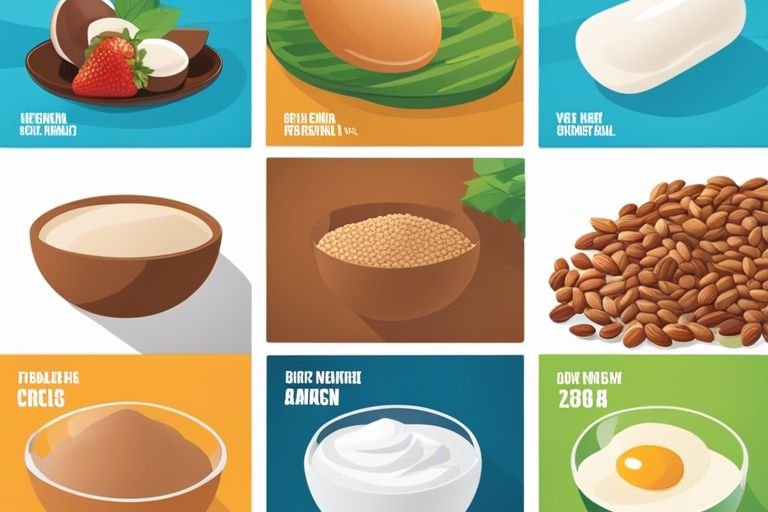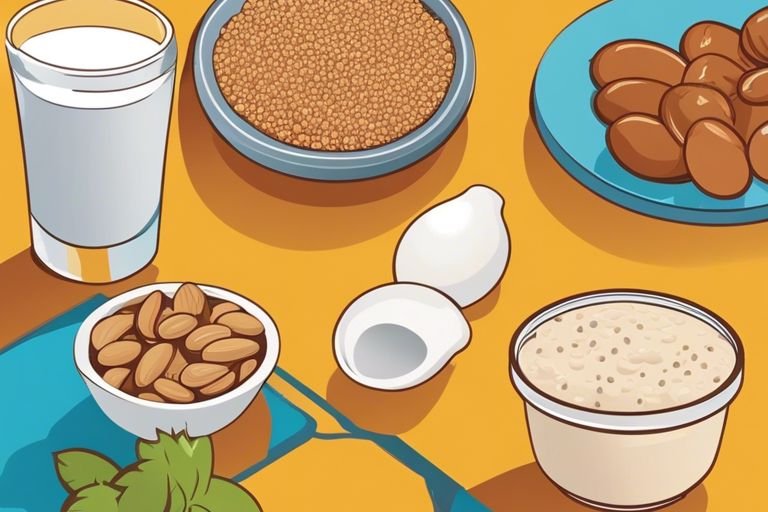As you initiate on your fitness journey, building muscle mass is likely at the top of your priority list. And when it comes to achieving this goal, protein is the ultimate game-changer. But with so many options available, it can be overwhelming to determine which protein sources are best for you. The good news is that you don’t have to look far. In this article, we’ll look into the top 8 protein sources that will help you build lean muscle and take your fitness to the next level. From lean meats to plant-based powerhouses, we’ve got you covered.
Key Takeaways:
- Lean Meats such as chicken breast, turkey, and lean cuts of beef or pork are high in protein and low in fat, making them an ideal choice for teenagers looking to build muscle.
- Variety is key when it comes to protein sources. In addition to lean meats, teenagers can also consume Fish, Eggs, Dairy, Legumes, Nuts and Seeds, Tofu and Tempeh, and Protein Powders to ensure they are getting enough protein in their diet.
- Plant-based options such as legumes, nuts and seeds, tofu, and tempeh provide excellent protein sources for teenagers who prefer a vegetarian or vegan diet.
Lean Meats
Your body needs protein to build and repair muscle tissue, and lean meats are an excellent way to get it. These protein-rich foods are also relatively low in fat, making them a great choice for teenagers looking to build muscle without adding extra calories.
High-Protein, Low-Fat Options
One of the best things about lean meats is that they’re packed with protein while being relatively low in fat. For example, a 3-ounce serving of chicken breast contains about 26 grams of protein and only 4 grams of fat. Similarly, a 3-ounce serving of turkey breast contains around 24 grams of protein and just 3 grams of fat.
Benefits of Chicken, Turkey, and Lean Beef or Pork
An added advantage of incorporating lean meats into your diet is that they provide important amino acids, vitamins, and minerals that support muscle growth and overall health.
Lean meats like chicken, turkey, and lean cuts of beef or pork are particularly beneficial because they’re rich in protein, vitamins B6 and B12, and minerals like selenium and zinc. These nutrients play a crucial role in muscle function, immune function, and energy production. By including lean meats in your diet, you’ll be providing your body with the necessary building blocks to support muscle growth and repair.
Fish
Now, let’s investigate one of the most nutritious protein sources for teenagers looking to build muscle: fish. Fatty fish, in particular, offer a unique combination of protein and omega-3 fatty acids that can support muscle growth and overall health.
Protein-Rich and Omega-3 Rich
For a protein-packed punch, fish like salmon, tuna, and mackerel are hard to beat. A 3-ounce serving of salmon, for example, provides about 20 grams of protein, while also delivering a healthy dose of omega-3 fatty acids.
Health Benefits of Salmon, Tuna, and Other Fatty Fish
An added bonus of incorporating fatty fish into your diet is the numerous health benefits they provide. These fish are rich in antioxidants, vitamins, and minerals that support heart health, brain function, and even joint health.
The omega-3 fatty acids found in fatty fish have anti-inflammatory properties, which can help reduce muscle soreness and inflammation after intense workouts. Additionally, the protein and healthy fats in fish can help support muscle recovery and growth, making them an ideal addition to your diet as you work to build muscle.
Eggs
Unlike other protein sources, eggs are an incredibly versatile and convenient option for teenagers looking to build muscle. You can boil them, scramble them, make omelets, or even bake with them.
A Complete Source of Protein
An egg contains about 6-7 grams of protein, making it an excellent addition to your muscle-building diet. As a complete source of protein, eggs provide all nine crucial amino acids that your body needs to build and repair muscle tissue.
Essential Amino Acids and Vitamins
One of the reasons eggs are so effective for building muscle is that they contain a rich mix of crucial amino acids, including branched-chain amino acids (BCAAs) like leucine, isoleucine, and valine. Additionally, eggs are a good source of several important vitamins, including vitamin D, B12, and riboflavin.
Another benefit of eggs is that they are rich in sulfur-containing amino acids like methionine and cysteine, which play a crucial role in muscle growth and recovery. These amino acids also help to reduce muscle soreness and inflammation after exercise, allowing you to recover faster and train harder. With eggs, you can be sure you’re providing your body with the nutrients it needs to build strong, lean muscle.
Dairy
Despite what you may have heard, dairy products are not just for kids. As a teenager looking to build muscle, you can benefit from incorporating dairy into your diet.
High-Quality Protein and Calcium
Proteins found in dairy products like milk, yogurt, and cheese are considered high-quality because they contain all nine imperative amino acids that your body needs to build and repair muscle tissue. Additionally, dairy is an excellent source of calcium, which is crucial for building strong bones and teeth.
Milk, Yogurt, and Cheese for Bone Health
One of the most significant advantages of dairy products is their ability to support bone health. Milk, yogurt, and cheese are rich in calcium, vitamin D, and other nutrients that help build and maintain strong bones.
Yogurt, in particular, is an excellent choice because it contains live cultures that can help support gut health, which is linked to overall immune function and muscle growth. Moreover, yogurt is often fortified with additional calcium and vitamin D, making it an even more effective bone-building food. By incorporating dairy products into your diet, you’ll be providing your body with the necessary building blocks to support muscle growth and overall health.
Legumes
Not only are legumes an excellent source of protein, but they’re also packed with nutrients and fiber, making them an ideal addition to your muscle-building diet.
Plant-Based Protein Powerhouses
On top of being rich in protein, legumes like beans, lentils, and chickpeas are also incredibly versatile and can be easily incorporated into your meals.
High in Fiber and Nutrients
Legumes are overflowing with fiber, vitamins, and minerals, making them a nutritional powerhouse.
With a single serving of legumes, you’ll not only get a significant dose of protein but also a boost of fiber, folate, and iron. For example, a cup of cooked lentils provides about 18g of protein, 16g of fiber, and 37% of your daily iron needs. This makes legumes an excellent choice for supporting muscle growth and overall health.

Nuts and Seeds
Once again, you’re probably already familiar with nuts and seeds as a healthy snack option, but did you know they’re also a great source of protein for building muscle?
Protein and Healthy Fats
Any discussion of nuts and seeds would be incomplete without mentioning their impressive protein content, which ranges from 15-20% of daily value per ounce. Additionally, they’re packed with healthy fats that support hormone production and overall health.
Almonds, Peanuts, Chia Seeds, and Flaxseeds
Healthy handfuls of almonds, peanuts, chia seeds, and flaxseeds can provide a significant boost to your daily protein intake, making them an excellent addition to your muscle-building diet.
Understanding the specific benefits of each of these nuts and seeds can help you make informed choices. For example, almonds are rich in magnesium and vitamin E, while peanuts are a good source of vitamin B3 and healthy fats. Chia seeds, on the other hand, are an excellent source of omega-3 fatty acids and fiber, while flaxseeds provide a rich source of lignans, which have been shown to have anti-inflammatory properties. By incorporating these nuts and seeds into your diet, you’ll not only be supporting your muscle growth but also overall health and well-being.
Alternative Protein Sources
Not all protein sources have to come from traditional animal products or legumes. There are alternative options that can provide the necessary protein for muscle growth and repair. As mentioned in Protein: Whole Food Sources Best for Your Athletic Teen, whole food sources are ideal, but alternatives can be useful supplements.
Tofu and Tempeh for Vegetarian and Vegan Diets
Protein-rich tofu and tempeh are excellent alternatives for vegetarians and vegans. These plant-based protein sources can be easily incorporated into your diet, providing all the necessary amino acids necessary for muscle growth. You can use them in a variety of dishes, from stir-fries to curries, making them a convenient and healthy option.
Protein Powders for Supplementing Dietary Intake
Powders made from whey, casein, or plant-based sources can be a useful addition to your diet, especially if you’re struggling to get enough protein from whole foods. These powders can be easily mixed with water or milk to create a quick and convenient protein shake.
Supplementing your diet with protein powders can be particularly helpful if you’re an athlete or engage in regular physical activity. You can take them post-workout to aid in muscle recovery or as a snack between meals to keep your protein levels topped up. Just remember to choose a reputable brand and follow the recommended serving sizes to avoid any adverse effects.
To wrap up
With this in mind, you now have a solid foundation to start building your muscle mass with the right protein sources. Note, incorporating these 8 top protein sources into your diet will not only help you achieve your fitness goals but also provide your body with the important nutrients it needs to function optimally. By making informed choices about your protein intake, you’ll be well on your way to a stronger, healthier you.
FAQ
Q: What are the best protein sources for teenagers looking to build muscle?
A: The top 8 protein sources for teenagers aiming to build muscle are lean meats (chicken breast, turkey, and lean cuts of beef or pork), fish (salmon, tuna, and other fatty fish), eggs, dairy (milk, yogurt, and cheese), legumes (beans, lentils, and chickpeas), nuts and seeds (almonds, peanuts, chia seeds, and flaxseeds), tofu and tempeh, and protein powders (whey, casein, or plant-based options).
Q: Are plant-based protein sources sufficient for building muscle?
A: Yes, plant-based protein sources can be sufficient for building muscle. Legumes, nuts and seeds, tofu, and tempeh are all high-quality protein sources that can provide the necessary amino acids for muscle growth and repair. Additionally, plant-based protein powders can be a convenient supplement to ensure adequate protein intake.
Q: Can I rely solely on protein powders to build muscle?
A: While protein powders can be a useful supplement, it’s not recommended to rely solely on them to build muscle. Whole foods like lean meats, fish, eggs, dairy, legumes, nuts, and seeds provide a range of vital nutrients, vitamins, and minerals that are important for overall health and muscle growth. Protein powders should be used to supplement a balanced diet, not replace it.
